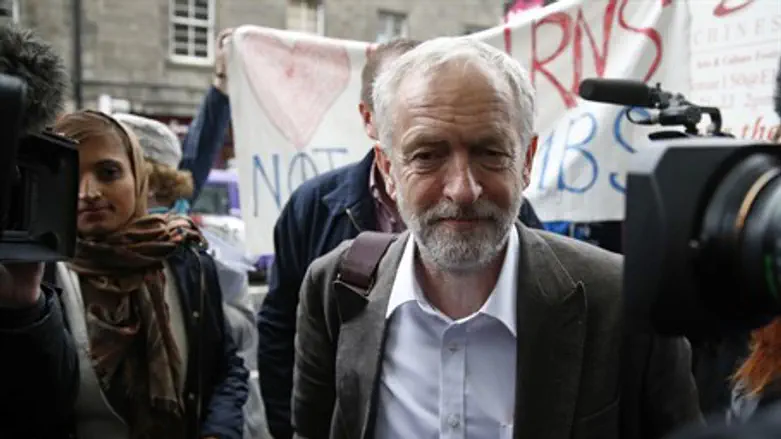
The man likely to be elected head of the UK's major opposition party, Labor MP Jeremy Corbyn, campaigned in support of two terrorists convicted for bombing Jewish and Israeli targets in London, it has been revealed.
It is just the latest disturbing revelation of the Labor front runner's connection to extremists, including terrorists and virulent anti-Semites.
Corbyn led the campaign to release Palestinian terrorists Jawad Botmeh and Samar Alami, who were convicted and sentenced to 20 years in prison for bombing the Israeli Embassy and a Jewish charity headquarters in 1994.
14 people were injured in the embassy attack, while six were wounded in the attack on the offices of the United Jewish Israel Appeal (UJIA) just one day later. Both attacks involved car bombs packed with high explosives.
Botmeh and Alami were found in possession of five pounds of explosives, which investigators say were were used to make the bombs, and a sizable cache of guns. But while they admitted possession of the arms the convicted terrorists protested their innocence, saying they weren't intended for use in the UK. Botmeh even claimed Israel had bombed the sites themselves to gain sympathy.
But a 2001 appeal against their conviction was rejected, with the prosecution noting the "overwhelming" evidence of their involvement in the plot - though their suspected accomplices have never been caught.
Undeterred, Corbyn took up their cause in 2002, signing five early day motions in Parliament between 2002-2006 and calling for their parole, according to the Jewish Chronicle. He called for the pair's release repeatedly, and in 2003 questioned then-Home Secretary David Blunkett over the investigation, suggesting the men had been framed.
His support for the bombers continued after their release from prison as well.
In 2013, five years after Botmeh was released, Corbyn campaigned for him to be elected to the Board of Governors at London's Metropolitan University.
Corbyn's campaign has been dogged by seemingly endless revelations of extremist ties and controversial comments.
Most recently, he came under fire in the British press for comments he made in 2011 describing Osama Bin Laden's assassination as "a tragedy." He has also been slammed for supporting Belgian Islamist Dyab Abou Jahjah, who said he "consider[s] every death of an American, British or Dutch soldier as a victory."
The Jewish community in particular has grown increasingly concerned over Corbyn's relationship with a wide range of vile anti-Semites and anti-Israel terrorist groups.
Among other things, in 2009 he famously called Hamas and Hezbollah his "friends," after inviting members of the terrorist groups to speak at the British Parliament.
He has also voiced strong support for anti-Semitic Israeli Islamist cleric Sheikh Raed Salah, and was recently revealed to have disturbing ties to several well-known holocaust deniers, and similarly for an anti-Semitic Christian cleric who was censured by the Church of England for promulgating hate-speech online.
Despite all that his campaign is still leading in the polls, making it very likely he will win the September 10 leadership elections and stand as Labor's candidate for Prime Minister at the next general elections.
His success has been attributed at least in part to surge in new membership applications to the Labor party, primarily coming from young, radical-left voters whose support for Corbyn is only buoyed with each revelation. Many more mainstream Labor members fear his appointment as head would make the party utterly unelectable.